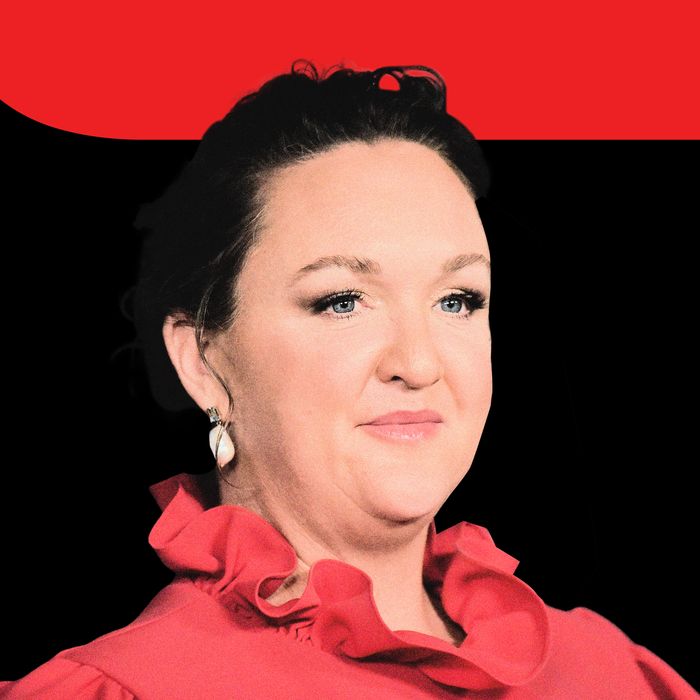
Kara Swisher has been grilling executives for decades, and in the latest episode of On With Kara Swisher, her guest is someone who has made a national name for herself doing the same in Congress: Katie Porter, the progressive California congresswoman and 2024 U.S. Senate candidate.
In their conversation, Swisher talks to the bankruptcy-law professor about Democrats’ failure to rein in monopolies, Mark Zuckerberg’s slow talking, whether or not she is a “bad boss,” and Porter’s famous whiteboard — which she uses during congressional hearings to interrogate CEOs and others in a way they and anyone else watching can easily understand. Porter also tells the story behind her conspicuous reading of The Subtle Art of Not Giving a F*ck on the House floor during Speaker Kevin McCarthy’s humiliating multi-vote leadership fight earlier this year. (She came across the book in a Little Free Library near her house that week, but found it “very bro-y.”) The self-professed “oversight queen” also explains how she sees “fighting bad guys” as her responsibility. (“Sometimes lately, frequently, the bad guys have been Trump Republicans. But sometimes the bad guy is a corporate CEO who’s screwing us. Sometimes the bad guy is a government official who will not pick up the tools of government and use them to do their job.”)
In the below segment, Swisher and Porter discuss the collapse of Silicon Valley Bank and how regulators responded, and why, in Porter’s mind, they could and should have done more to prevent that from happening.

On With Kara Swisher
Subscribe on:
Kara Swisher: There’s no actual proof that the regulatory rule book is [what caused SVB’s failure]. It’s a pretty basic cause of what happened. They were investing in very safe treasuries. They sort of broke the basic banking law of borrow short and lend long, and they were stuck in these treasuries and had to sell them off very quickly when the run on the bank was started by nervous venture capitalists, but federal regulators were in there warning them of their problems several different times.
Katie Porter: Not loudly enough.
Kara Swisher: Okay.
Katie Porter: I mean, the job of the federal regulators is not to say, “You know, there might be a problem here if you drive that airplane off the end of the runway.” It is to put rules in place so that it doesn’t happen. So for the Fed to now say, “Yeah, we knew,” I think just begs the question, well, what did you do with that knowledge? Because the job of the Fed is not to say, later on, “We told you so.” That’s the job of politicians. The job of the regulators was to do something about it.
Kara Swisher: So if that was in place, because a lot of Republicans are talking about the fiscal policy and the interest-rate hikes that put these banks, and several of them, not just this one, in a bind when they were investing in things that are considered relatively safe.
Katie Porter: Well, but let’s talk about what the Dodd-Frank rules did. I mean, one of the things that — you’re right, that the fundamental problem here is that SVB forgot the most basic rule of finance, which is that interest rates do two things. They go up and they go down, and they didn’t plan for that.
And they invested in these safe but long-term securities and they had a mismatch when people wanted their money today. Right? And so one of the things that stress tests do for banks is imagine scenarios like that. What if the interest rates went up faster? What if there was a rapid rise in increase? Would you still have enough liquidity? Because it’s a known fact that when interest rates go up, the price of bonds go down. This is a known fact. It’s repeated in every Wall Street Journal article in which millions of Americans say, “I don’t know what that means,” but they just keep reading. So this was a known thing and we could have stress-tested them under that kind of scenario.
Capital holding requirements mean that if you make a mistake and you guess wrong on the risk, you have a little more cushion to cover your ass, and this law removed that. The lack of regulation here didn’t cause the run. The lack of regulation is the cause of the failure.
Kara Swisher: Sure. But this run was unusual. $42 billion in a single day. And in this particular case, the concentration of the bank in the technology sector, which was also declining. There were layoffs. The start-up money’s less, everything was happening at the same time. And this was a group of people that moved very quickly, compared to — most people don’t move that quickly, and they aren’t using online banking in that way. And they weren’t directed as a group. Talk about the impact of the venture capitalists, some of them doing that. So others said, “No, leave it in there. Calm the fuck down.” They weren’t the loudest ones. And in fact, they weren’t loud at all on places like Twitter. Talk about what, what happened there from your perspective.
Katie Porter: Yeah, so I think the first point that you made, I just wanna echo ’cause I think it’s the, really, the big policy puzzle coming out of this that we don’t have the answer to is how, what do you do when you have an sort of analog banking law in a digital world, right? That part of this was something we haven’t seen before. Every minute that our regulators and our — these are dedicated government employees who are trying to find a buyer and stabilize this bank, though that was falling out from underneath them because of the ability of folks to communicate to bank online, the sort of social networking even of the depositors, both in this sort of online social way, but actually like they’re all friends too.
So yes, I think that was a big contributor here. I don’t think it’s limited to this community, but this is a, you know, by definition this is an online community. I do think that the folks who said, “Stay calm, keep your money there, it’s gonna be okay. We have confidence in the bank.” — because this was a banking failure where the loans were pretty good and the assets were U.S. treasuries. Right. The problem here was the mismatch on that, which does make me a little surprised, frankly. I was a little surprised they couldn’t find a buyer.
Kara Swisher: But when you look at what’s happening, you’re saying there’s not something bad here, but there’s certainly a DOJ and SEC inquiry into potential insider trading, stock sales of key leaders, a possible organized bank run. They have to be looking at that too, right? That maybe some of these people don’t mind a bank-run kind of thing.
Katie Porter: I mean, look, the technical term for this is counterparty risk, right? I mean, there are counterparties here who shorted and who potentially benefited from it. And we saw an awful lot of that in the last financial crisis. So I do think we need to have an investigation about the executives here, about the Federal Reserve folks and what they were doing in advance, about Goldman’s role in this deal. I mean, people are like, “Can you believe it? Goldman made money on both sides.” And I was like, “That’s literally the definition of Goldman Sachs.” Like, that is — like, you look it up in the dictionary: Goldman, an entity that manages to make money while you’re losing it and make money while you’re making it. That’s literally what, that’s what they do. That’s their business model. But I do think we need to have the full regulatory apparatus. Like, I’m an oversight queen. I believe in it. So I want the SEC on the job here. I want DOJ on the job. I want FDIC on the job. The California regulator here. There are questions to be answered, but to be clear, I mean, people are like, “Oh my God, can you believe the executives paid themselves?”
They do that like every day, people. Like, it may or may not be —
Kara Swisher: But this was in the two weeks before when they were clearly, it was clearly there were problems happening.
Katie Porter: And I will say as someone who taught bankruptcy law, that’s pretty typical. And there are tools already … So people are rushing to introduce new bills on this. There are tools already to get these payments back, to claw these payments back, as there should be. As there should be.
Kara Swisher: But speaking of clawing back money, one of the things that the Republicans are trying to cast about, and I actually had an argument with one of the representatives about this, was whether it was a bailout, even though it’s not: It didn’t use taxpayer money, and the government holds the assets. But that’s a Republican talking point. “This is a bailout.” Which, of course, even Biden had a problem with in 2008. How do you get the idea that it’s not a bailout, this idea that we’re having to save banks. ’Cause it could happen again, even with good banks.
Katie Porter: Yep. So I think the label here is sort of tough, right? Because look, the general rule is if you have over $250,000 in your account, if you have under that, you’re insured, and you will be made whole by the FDIC insurance fund. But if you have more — I never knew how many rich people I knew until Silicon Valley Bank went under; I realized I had been underasking for contributions for quite some time over the weekend — and so the idea though is if you’re over that, then there’s some loss and deposit insurance isn’t free. It doesn’t come from fairy dust. Deposit insurance comes from fees that banks pay in, and they pay in an amount that is based on the $250,000 cap. So if we want to move to functionally, as we are here, ensuring everybody, regardless of an amount, I think the better way to do that is to make that as a policy decision with full understanding of what that’s gonna mean for banking costs and who bears banking costs. The first rule of banking is the customer pays all the fees. The second rule of banking is you take all the profit. So we will, if we decide to do this, if we empty the deposit insurance fund to cover everybody’s amounts, we will have to replenish it. And again, it’s not gonna come from fairy dust, it’ll come from charges that we all pay as depositors and banking customers.
This interview has been edited for length and clarity.
On With Kara Swisher is produced by Nayeema Raza, Blakeney Schick, Cristian Castro Rossel, and Rafaela Siewert, with mixing by Fernando Arruda, engineering by Christopher Shurtleff, and theme music by Trackademics. New episodes will drop every Monday and Thursday. Follow the show on Apple Podcasts, Spotify, or wherever you get your podcasts.
More From 'on with kara swisher'
- Ron Klain Still Thinks Biden Got a Raw Deal
- Gretchen Whitmer on Why She’s Still Confident in Biden
- AOC on Gaza, Insults, AI, and Whether Trump Will Lock Her Up





























